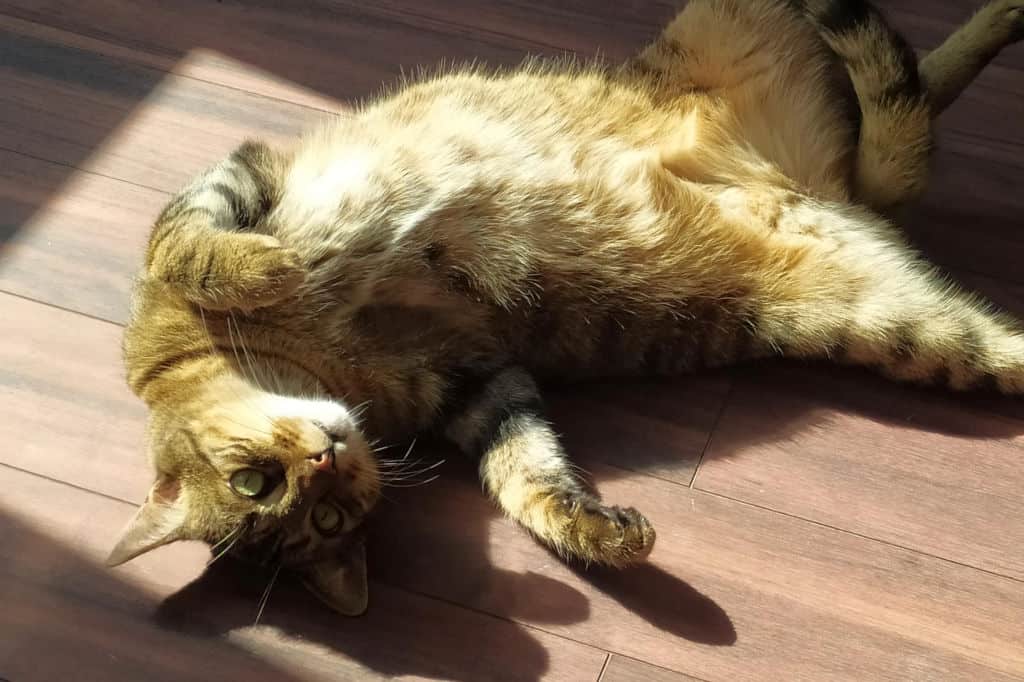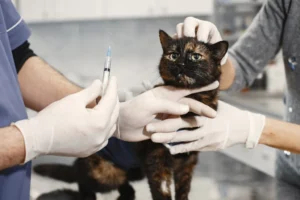Has your cat been misdiagnosed by a veterinarian? Don’t panic – there are steps you can take to address the situation and ensure your furry friend receives the care they need.
While your concerns and doubts can sometimes be rectified with a clear conversation, other times, a bigger change is needed. Don’t hesitate to advocate for your cat’s health and wellbeing during a vet misdiagnosis. And in this blog post, we’ll show you how exactly to do that.

Can Vets Misdiagnose Your Cat?
Yes, vets can make a diagnosis error. They are humans, after all, and prone to making mistakes.
These errors can be caused by a variety of factors, including inadequate medical histories, incomplete physical exams, and misinterpretation of diagnostic tests.
According to a study published in the Journal of Veterinary Internal Medicine, medical errors occasionally occur in veterinary hospitals, with approximately five errors per 1,000 patient visits across the three hospitals tested.
One of the most common pieces of information that veterinarians fail to include in the medical record is a comprehensive history of the pet’s symptoms and behavior, as reported by the owner. This can lead to a number of problems, including misdiagnosis, incorrect treatment, and poor continuity of care.
To avoid this oversight, maintain your own health diary for your cat, noting down any odd behaviors, appetite changes, or visible symptoms. This practice makes revisiting and cross-referencing health issues more effective.
Keep in mind that while diagnostic errors do occur, most vets take their job very seriously and work diligently to provide the best possible care for their patients. Always consider discussing your concerns openly with your vet. Sometimes, a mere clarification can address the concern of vet misdiagnosis
What to Do When Your Cat Has Been Misdiagnosed?
When you suspect that your cat has been misdiagnosed, it’s essential to take action to ensure your pet receives the proper care.
Bring Up Your Concerns to Your Vet
First and foremost, it’s crucial to keep calm and maintain open communication.
If you have suspicions or doubts about the diagnosis, bring them up directly with your vet. A clear conversation can sometimes quickly address and rectify potential misunderstandings or oversights. They often appreciate candid feedback and may offer a follow-up consultation or another form of recourse.
If the communication fails or your vet’s clinic fails to address your concerns of vet misdiagnosis, here are some other actions you may want to consider.
Gather All Relevant Medical Records
Get copies of your cat’s medical records from your current vet and any other veterinarians who have treated your pet. This will help you to better understand your cat’s medical history and any previous diagnoses.
Get a Second Opinion
A second opinion can help you to identify any potential misdiagnosis or errors in treatment. Consult with another veterinarian to confirm the original diagnosis and treatment plan.
When seeking a second opinion, provide the new veterinarian with as much information as possible. This includes your cat’s medical records, test results, and any medications they are currently taking. We have a full guide on how to choose the right vet here.
For chronic conditions, such as diabetes or kidney disease, it’s also helpful to keep a log of your cat’s symptoms and behaviors to help the new veterinarian better understand the situation.
Consider Filing a Complaint
If you suspect your vet has acted negligently, you may want to file a complaint with the veterinary board or seek legal advice. Remember that the process for filing a complaint can vary by state, so be sure to check your local regulations.
Negligence can take many forms in veterinary medicine, such as failure to perform necessary tests, misinterpretation of test results, or failure to recognize or treat symptoms. For example, if a veterinarian fails to perform a blood test on a cat with chronic vomiting and diarrhea and later discovers that the cat has kidney disease, this could be considered negligence.
By filing a complaint, you can hold your veterinarian accountable for their actions and prevent other pets from experiencing similar misdiagnoses in the future.
When filing a complaint with the veterinary board, provide as much detail as possible about the situation, including dates, times, and specific incidents. It’s also helpful to provide any evidence you may have, such as medical records or witness statements.
The veterinary board may take some time to investigate the complaint, so patience is important throughout the process.
Seek Legal Recourse, but be Mindful
If your cat’s misdiagnosis resulted in expensive medical bills, you may be able to seek legal recourse to recoup these expenses.
For example, if your veterinarian’s misdiagnosis led to unnecessary surgeries or treatments, you may be able to sue for malpractice. Consult a lawyer to discuss your options and determine the best course of action for your situation.
One potential negative side of seeking legal action against a veterinarian is the emotional toll it can take on you and your pet. Legal proceedings can be stressful and time-consuming, and it’s important to carefully consider the potential outcomes and costs before pursuing legal action.
Additionally, pursuing legal action could damage your relationship with your veterinarian, making it more difficult to seek care for your pet in the future.
Advocate for Your Cat’s Health
One important aspect of dealing with a misdiagnosis is advocating for your cat’s health and well-being.
This can involve being proactive about your cat’s medical care, asking questions, and ensuring that your veterinarian takes all necessary steps to properly diagnose and treat your cat’s condition.
For example, if you suspect that your cat has an underlying health issue that your veterinarian is overlooking, it’s important to speak up and ask for further testing or referrals to a specialist.
When you’re uncertain about the diagnosis, always ask about any diagnostic tests, like blood work or imaging, which could further confirm or negate the current findings.
By advocating for your cat’s health and asking for additional tests or specialist referrals, you can help to ensure that your cat receives the proper care and treatment for their specific condition. This can improve your cat’s overall health and well-being, and potentially even save their life.

Getting a Second Opinion (Essential Tips)
When seeking a second opinion for your cat’s health, it’s important to find a qualified veterinarian who can provide an accurate diagnosis and appropriate treatment plan. Here are a few tips to keep in mind.
While looking for a new vet
- Look for a vet with experience in your cat’s specific health issue. For example, if your cat has a heart condition, look for a veterinarian specializing in cardiology.
- Check for credentials and certifications, such as being board-certified in feline medicine or having additional training in a specialized area.
- You can check for complaints or malpractice lawsuits filed against the veterinarian by contacting your state’s veterinary medical board.
- Schedule a consultation with the new veterinarian to discuss your cat’s case and ask any questions you may have.
- Be prepared to pay for the consultation and any additional tests or procedures that may be necessary.
Remember, when reaching out to another vet, avoid leading with a negative tone about your past experiences. Instead, focus on the current concern and any insights you hope to gain.
Here’s a more in-dept guide on how to find the right vet. We’ve included where to start, what to look for, and how to choose the perfect one.
Before and during the new vet’s consultation
Make a list of any questions before the appointment to ensure you don’t forget to ask any important questions. Ask for specific examples of how the veterinarian has successfully treated similar cases in the past. This can give you an idea of their experience and success rate. For example, you can ask these questions:
- “What treatment options do you recommend for my cat’s specific condition?”
- “How long will it take to see improvement?”
- “Are there any side effects of the medication or treatment?”
- “Are there any alternative treatment options for my cat’s condition?”
- “How often should I bring my cat in for follow-up appointments and check-ups?”
- “Are there any lifestyle changes I should make to help improve my cat’s health?”
- “What is the long-term outlook for my cat’s health?”
Be upfront about your cat’s medical history and any previous diagnoses. Also, be honest about your previous experience with your previous vet and what you are looking for in a new one, as it can help you find a vet that meets your needs and expectations.
After the appointment with the new vet
After the appointment, the veterinarian will provide a diagnosis and treatment plan. It’s important to review this plan carefully and ask any questions you may have to ensure that you understand the diagnosis and the recommended course of action.
What to expect from the new vet:
- Your cat may need to undergo additional tests or procedures to confirm the diagnosis such as:
- blood work
- Imaging (X-rays or ultrasounds)
- biopsies
- The new veterinarian may recommend different treatments or medications
- The new veterinarian may also recommend lifestyle changes for your cat, such as changes to their diet or exercise routine, which you may want to follow.
Additionally, it may be beneficial to seek a third opinion if there is still uncertainty or confusion about your cat’s diagnosis and treatment plan. Getting a third opinion can help provide more clarity and confidence in the treatment plan, as well as offer an opportunity to hear a fresh perspective and potentially catch any errors or oversights.
By taking these steps, you can help ensure that your cat receives the best possible care and treatment plan, and that any misdiagnosis or errors in treatment are identified and addressed.
No Diagnosis for Your Cat: Now What?
If the veterinarian can’t determine what is wrong with your cat, it may be beneficial to seek a referral to a specialist, such as an internal medicine or oncology specialist.
These specialists have additional training and expertise in diagnosing and treating complex or uncommon conditions. It may also be helpful to keep a detailed record of your cat’s symptoms and behaviors to provide to the specialist, as well as any previous medical records and test results.
While it can be frustrating when a diagnosis isn’t immediately clear, it’s important to remain patient and persistent in seeking a resolution for your cat’s health issues.
Remember that your cat’s health is a top priority, and advocating for their well-being is okay. Don’t be afraid to speak up and ask questions, even if it may seem inconvenient or uncomfortable. By being proactive and taking an active role in your cat’s healthcare, you can help ensure they receive the best possible care and treatment.
FAQs
Can misdiagnosis harm my cat’s health?
Yes, misdiagnosis can lead to inappropriate treatment, which can cause harm to your cat’s health. It’s important to seek a second opinion if you suspect your cat has been misdiagnosed.
What if I can’t afford a second opinion or treatment?
Many veterinary clinics offer payment plans or financing options to help make care more affordable. Some organizations or charities can provide financial assistance: Humane Society’s RedRover Relief program, the Pet Fund, and the AAHA Helping Pets Fund.
How to prevent misdiagnosis in cats?
You can prevent misdiagnosis in cats by finding a qualified vet with expertise in feline medicine, being honest about your cat’s medical history, and seeking a second opinion if necessary.
Alex, a passionate animal lover, has experience in training and understanding animal behavior. As a proud pet parent to two dogs and three cats, he founded AnimalReport.net to share insights from animal experts and expand his knowledge of the animal kingdom.




